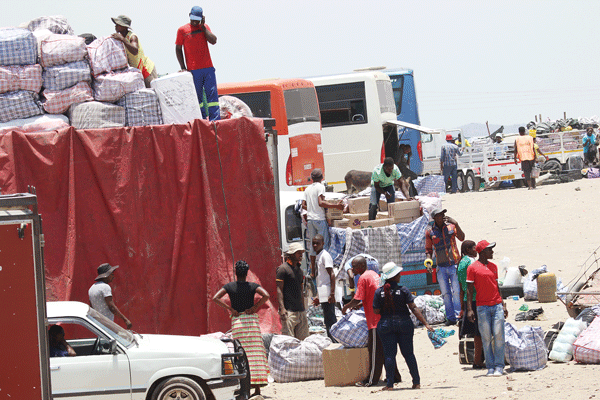Source: Informal traders resort to smuggling | The Standard
BY LIZWE SEBATHA
With no formal employment, Bekithemba Ncube* says smuggling groceries and other goods from neighbouring Botswana for resale in Bulawayo helps him put food on the table for his family.
The financial benefits from the illegal trade outweigh the risks of arrest and jail time, he argues.
“We travel mostly at night to evade arrest,” said Ncube, an informal trader.
Ncube runs a small grocery shop in Bulawayo’s busy 5th Avenue agricultural market.
A number of grocery shops, mostly selling cheap smuggled goods, have “taken” over trading spaces at Bulawayo’s agricultural market.
The grocery shops are always crowded while other traders that purchase those goods from “smugglers” operate from city pavements.
“If I am not travelling to Botswana, my links provide the groceries from the neighbouring country via illegal entry points, paying bribes along the way where possible,” Ncube said.
“We resort to smuggling because of the high duty taxes and corruption at the customs points. And besides, borders are closed.”
According to police, the smuggling of goods via illegal entry points in rural Plumtree is also rampant citing the recent arrests of smugglers.
In May, Matabeleland South police confiscated an assortment of smuggled goods in Mbimba and Madlambuzi in Plumtree.
“On May 16, police in Madlambuzi intercepted a grey Toyota D4D twin cab FF20 HP GP with trailer FH19PM GP laden with smuggled goods at Madlambuzi business centre and nabbed Mqondisi Dube, Reason Ncube and Butholezwe Mkwanazi for smuggling,” the Zimbabwe Republic Police said.
“Police also recovered an abandoned Toyota GD6 vehicle GIMM74 with trailer 002GIF GP at Mbimba business centre laden with smuggled goods.”
A month later in June, police revealed the arrest of three other suspects for smuggling goods into the country in Nxele, also in Plumtree.
“On June 26, police in Plumtree arrested 3 suspects for smuggling and recovered 6×43-inch LED television sets, 26 Waxiba radios, 15 Bluetooth box speakers, 50 litres of diesel and various clothing at Nxele illegal crossing point,” the ZRP added.
Various state security organs are involved in joint border patrols code-named “Operation No to Cross-Border Crimes” to curb the illegal border crossings by returning residents.
Home Affairs minister Kazembe Kazembe has said drones will be deployed at the borders to fight the law-breaking.
However, the practice continues to flourish under law enforcement watch.
Former Ntabazinduna chief Nhlanhlayamangwe Ndiweni said the government was fighting a losing battle.
“If the government of the day has failed to provide for the people, then it is only right and proper that they fend for themselves,” Ndiweni said.
“They (government) compound this failure by forcing the ordinary man and woman to border- jump instead of allowing them to travel in an orderly fashion with customs duties or payments of any sorts, on what goods they are carrying.”
Bulawayo-based commentator Reginald Shoko also admitted that the government was fighting a losing battle as he called on policymakers to address challenges facing local industry.
“Fighting smuggling is a good way of doing things, but is not a panacea of solving the problems that are facing the local industry and consumers which then forces the consumer to lean more on smuggled goods,” Shoko said.
He argued that people have been forced to smuggle because of the high cost of goods locally, emphasising the need to look at internal devaluation as some prices are a result of high exchange rates and “pure greediness”.
“We need to look at the build-up of prices from electricity, labour costs and all other cost drivers that affect the final pricing structure in Zimbabwe so that the prices are competitive,” he said.
The national statistical agency, ZimStat, said the food poverty line (FPL) as of June 2021 stood at $4,271. 85. This means that the minimum needs basket cost that much per person in June 2021.
This represents an increase of 3.2% over the May 2021 figure of $4,139.10
Estimates by the government and other independent agencies show that the smuggling of goods costs the Treasury nearly US$1 billion a year in unpaid customs duty.
Without any means of escaping the socio-economic crisis characterised by high unemployment, Ncube says the need to fend for his family motivates him to continue with smuggling.
“If the employed are struggling to make ends meet, how do they expect us to survive? …this is my meal ticket also,” Ncube says.
- This article was originally published by The Citizen Bulletin, a nonprofit news organisation that produces hard-hitting, hyperlocal reporting and analysis for the southwestern region of Matabeleland.
- Not real name

COMMENTS